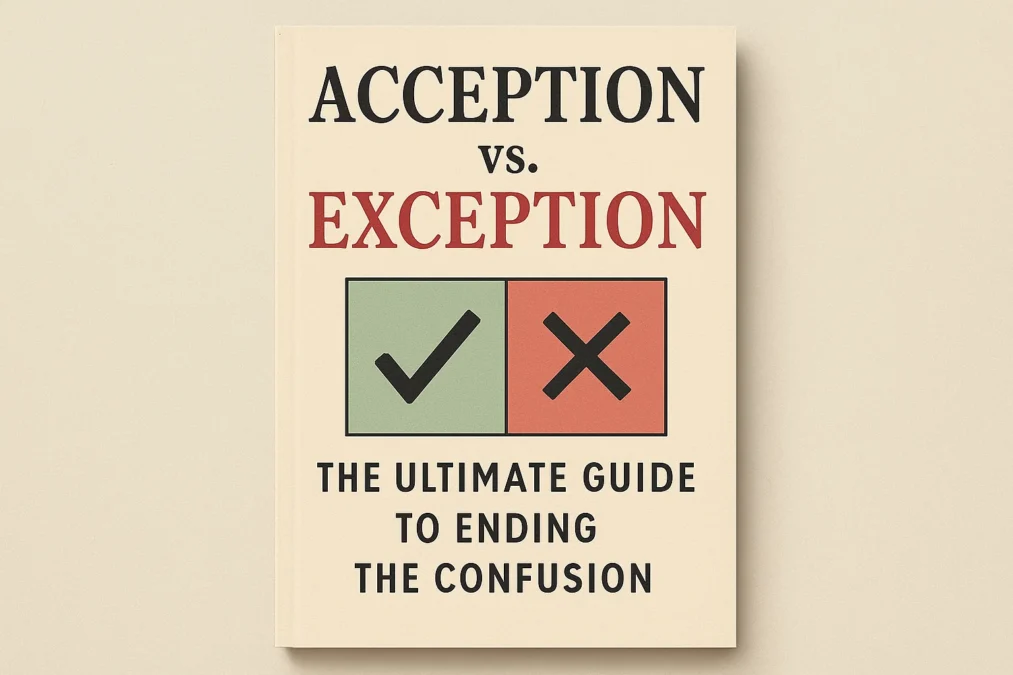Have you ever been typing an important email or crafting a crucial document, only to freeze at a particular word pair? Your fingers hover over the keyboard, and a flicker of doubt crosses your mind: is it “acception” or “exception”? You’re not alone. This is one of the most common linguistic mix-ups in the English language, a classic case of a word that sounds like it should exist versus the word that actually does exist and carries the meaning you intend.
This confusion often stems from the way we process language. We hear the correct term “exception” used in phrases like “with the exception of” or “that is an exception to the rule.” Our brains, being brilliant pattern-recognizing machines, then incorrectly back-form a verb “to except” into a noun “acception,” mirroring the relationship between “accept” and “acceptance.” But language is a tricky beast, and it doesn’t always follow logical rules. This article is your definitive guide to untangling this grammatical knot. We will dive deep into the definitions, origins, and correct usage of these terms, ensuring you never second-guess yourself again. By the end, you’ll not only understand the difference but also possess the tools to explain it to others, turning a common error into a showcase of your language expertise.
Our journey will take us through the history of these words, explore their modern applications with clear examples, and provide you with simple, memorable tricks to keep them straight. We’ll also address the related terms that often add to the confusion, like “acceptance” and “exceptional.” Consider this your one-stop resource for mastering “acception vs exception” once and for all. Let’s begin by confronting the elephant in the room: the word that causes all the trouble.
The Myth of “Acception”: Why This Word Doesn’t Exist (In Modern English)
Let’s address the most critical point head-on. In contemporary standard English, the word “acception” is not considered a valid word. If you use it in formal writing, speech, or professional communication, it will be marked as a spelling error or a malapropism—the mistaken use of a word in place of a similar-sounding one. You will not find it in modern dictionaries like Merriam-Webster, Oxford, or Cambridge as a stand-alone term with its own definition. Its use is a clear indicator that the speaker or writer has confused the sounds and meanings of “accept” and “except.”
So, why does this non-word feel so right to so many people? The primary reason is analogy. We have many word pairs in English that follow a predictable pattern where a verb form leads to a noun ending in “-tion” or “-ance.” For example, “perceive” becomes “perception,” “describe” becomes “description,” and crucially, “accept” becomes “acceptance.” Our brains, seeking patterns, incorrectly apply this same rule to “except,” manufacturing the noun “acception.” However, “except” already has its own noun form: exception. Language evolution is messy and doesn’t always follow a neat logic, and this is a perfect case of an exception to our expected grammatical pattern.
It’s worth noting that “acception” did have a very obscure, archaic meaning centuries ago, related to the meaning or interpretation of a word. You might stumble upon it in texts from the 16th or 17th centuries. However, this usage is entirely obsolete and has been completely supplanted by words like “meaning,” “definition,” or “interpretation.” For all practical purposes in the 21st century, in any context from academic papers to text messages, “acception” is an error. The correct noun you are looking for is almost always “exception.”
Understanding “Exception”: The Correct and Powerful Noun
Now that we’ve dismissed the myth, let’s turn our full attention to the real star of the show: exception. This is a robust and commonly used noun in English with a few nuanced meanings. At its core, an exception is something or someone that is excluded from a general statement, rule, or group. It’s the outlier, the special case, the thing that doesn’t fit the established pattern. Think of a rule as a net designed to catch all instances of something; an exception is the one that slips through the holes.
The word “exception” is incredibly versatile and appears in numerous common phrases. “To take exception to something” means to express offense or disagreement. When you say “with the exception of,” you are specifying what is being excluded (e.g., “Everyone, with the exception of John, attended the meeting”). The phrase “the exception that proves the rule” is often misunderstood; its original meaning suggests that the presence of an exception confirms that a rule exists for all other cases. In the world of programming and technology, an “exception” is an event that disrupts the normal flow of a program’s instructions, requiring special handling—a very literal digital outlier.
Understanding “exception” fully allows for precise communication. It allows you to acknowledge that your statement isn’t absolute, to highlight unusual cases, and to argue against generalizations. It’s a word that adds depth and accuracy to your language. For instance, saying “I love all animals, with the exception of spiders” is much more specific than just saying “I love all animals.” It communicates a general truth while also acknowledging a personal exclusion, making your communication more authentic and detailed.
The Root of the Confusion: “Accept” vs “Except”
To truly conquer the “acception vs exception” dilemma, we must go back to the source: the two verbs that start it all, “accept” and “except.” These two words are homophones—they sound almost identical when spoken quickly—but their meanings are vastly different. This auditory similarity is the gasoline on the fire of this common confusion. However, their spellings provide the first clue to distinguishing them.
Accept is a verb that means to receive or agree to something willingly. It involves consent, recognition, or reception. You accept a gift, accept an apology, or accept a job offer. It’s about taking something in or approving of it. The word comes from the Latin accipere, meaning “to take or receive.” Think of the two ‘c’s in “accept” as being open to receiving something. On the other hand, except is most commonly used as a preposition or conjunction meaning to exclude or make an exclusion. It signals that something is being left out. As a preposition, it is used like this: “Everyone except Maria understood the joke.” As a verb (though this is rarer), it means to exclude or leave out: “He was excepted from the requirement due to his experience.”
The key to remembering the difference lies in their prefixes. “Ac-” often relates to “to” or “toward” (as in accelerate, meaning to move toward speed), which fits with “accepting” something toward you. “Ex-” means “out of” or “from” (as in exit, exhale, exclude), which perfectly fits with “excepting” something, or taking it out of consideration. When you are talking about exclusion, you are making an exception. When you are talking about agreement or reception, you are giving your acceptance. This fundamental understanding of the root verbs is the most powerful tool for avoiding the “acception” error.
The Role of “Acceptance”: The Real Noun for “Accept”
If “acception” is the incorrect, mythical noun for “accept,” what is the correct one? The answer is acceptance. This is the word you should use when you need a noun form that conveys the act of receiving, agreeing to, or believing in something. Acceptance is the state of being accepted or accepting. It covers a wide range of contexts, from the simple act of taking a physical object to complex psychological states.
In a practical sense, acceptance is what you give when you receive a delivered package—a proof of acceptance. In a social context, it refers to being welcomed into a group or community. In psychology, acceptance is a crucial concept, often discussed in therapies like Acceptance and Commitment Therapy (ACT), where it means acknowledging and embracing one’s thoughts and feelings without judgment. The word is also central to legal and business contexts; a “contractual acceptance” finalizes an agreement, and a “banker’s acceptance” is a financial instrument.
Using “acceptance” correctly immediately elevates your language and avoids the glaring error of “acception.” For example, you would say, “Her acceptance of the award was graceful,” not “Her acception of the award was graceful.” Or, “The team’s acceptance of the new policy was swift.” Remembering the pair “accept” and “acceptance” is just as important as remembering “except” and “exception.” They are two parallel pairs that should never cross: one is for inclusion and agreement, the other for exclusion and deviation.
Common Phrases and Idioms Featuring “Exception”
The word “exception” is embedded in the fabric of English through numerous common phrases and idioms. Understanding these will not only reinforce the correct usage but also make your speech and writing more natural and idiomatic. These phrases are used frequently in everyday conversation, literature, and professional settings.
One of the most famous is “the exception that proves the rule.” This phrase is often used to acknowledge an exception to a general rule, arguing that the exception’s existence actually reinforces the rule’s validity for all other cases. Another common phrase is “to take exception to” something, which means to object strongly or to be offended by it. For example, “She took exception to his rude comments.” You also often hear “with the exception of” or “without exception,” which are used to specify inclusions or exclusions clearly. “Without exception” implies that the rule applies 100% universally, with no outliers whatsoever.
In the world of business and law, you might hear the term “exception handling” or “exceptions report.” These refer to the process of dealing with anomalies or deviations from standard procedure. In software, “throwing an exception” is a technical term for signaling an error or an unexpected event that needs to be managed by a different part of the program. These varied uses show just how pervasive the concept of an exception is across different fields, always carrying that core idea of an exclusion or a deviation from the norm.
The Judger vs Perceiver Face: Decoding Personality in Every Expression
How to Remember the Difference: Simple Mnemonics and Tricks
For many people, understanding the rule is one thing, but remembering it in the heat of the moment is another. That’s where simple mnemonic devices and memory tricks come in handy. These mental shortcuts can help you quickly recall which word is correct without having to replay the entire grammatical history in your head.
One of the best mnemonics focuses on the first letters. Remember that Exclude starts with ‘Ex-‘ and Exception also starts with ‘Ex-‘. An exception excludes something. Conversely, Accept means to receive or agree, which you can think of as adding something to your view. Another great trick is to look at the letters themselves. The ‘X’ in “except” and “exception” can be visualized as a cross-out mark—a symbol for exclusion. There’s no ‘X’ in “accept” or “acceptance,” which are about inclusion.
You can also use a simple phrase to lock it in: “You accept an apology,” and both “accept” and “apology” start with ‘A’. Or, “You make an exception to an exclusion,” linking the ‘Ex’s together. If you’re ever unsure, try substituting the words “exclude” or “exclusion.” If it makes sense, then “exception” is the word you need. If not, you’re probably looking for “accept” or “acceptance.” With a little practice, these checks will become second nature.
The Impact of Getting It Wrong: Why Precision Matters
You might wonder if mixing up “acception” and “exception” is really such a big deal. In casual text messages with friends, the meaning might still get across. However, in any formal, academic, or professional context, using the non-word “acception” can have a negative impact on how you are perceived. Precision in language is a marker of credibility, attention to detail, and education.
In a professional setting, such as a resume, cover letter, or business proposal, a mistake like this can undermine your message. It can suggest carelessness or a lack of strong communication skills, which are critical in almost every field. For students, using “acception” in an essay will likely result in lost points for grammar and mechanics. In public communication, such as a blog post, article, or speech, errors can damage your authority and make readers question the accuracy of your other information.
Language is a tool for building trust. Using words correctly demonstrates competence and respect for your audience. It ensures that your message is clear, unambiguous, and professional. Avoiding the “acception” error is a simple way to safeguard your credibility and present yourself as a careful and effective communicator. It’s a small detail that can make a significant difference in how your intelligence and professionalism are judged.
Beyond the Basics: Related Terms and Their Meanings
To achieve true mastery, it helps to understand the entire word family surrounding this common confusion. Exploring related terms solidifies the core concepts and prepares you to use a richer vocabulary with confidence. These words often appear in similar contexts but have distinct roles.
Exceptional is an adjective derived from “exception.” It generally means unusually good, outstanding, or extraordinary. However, it can also simply mean being an exception, as in “an exceptional case.” Exceptionally is the adverb form, meaning to an unusual degree, as in “exceptionally talented.” Except itself can be a verb, though it’s less common, meaning to exclude or leave out. On the other side, we have acceptable, an adjective meaning satisfactory or adequate, derived from “accept.” Acceptability is the noun form describing the quality of being acceptable.
Understanding these related terms helps you see the broader patterns. The “ex-” family is all about ex*clusion and being *ex*traordinary (outside the ordinary). The “ac-” family is about *ac*quiescence, *ac*quisition, and *ac*cord. Seeing these words as part of two distinct systems makes it much harder to confuse them. You wouldn’t say “acceptional” because that would mix the two systems—the correct word is “exceptional.” This systemic understanding is the final step in moving from simple memorization to deep knowledge.
A Side-by-Side Comparison
To visually summarize the key differences, the following table provides a clear, at-a-glance reference for the correct terms and their usage.
| Feature | Accept / Acceptance | Except / Exception |
|---|---|---|
| Part of Speech | Verb (accept), Noun (acceptance) | Preposition/Verb (except), Noun (exception) |
| Core Meaning | To receive willingly; to agree to | To exclude; to leave out |
| Key Concept | Inclusion, Agreement, Reception | Exclusion, Deviation, Anomaly |
| Example (Verb) | “I accept your offer.” | “The rule excepted senior citizens.” |
| Example (Noun) | “His acceptance speech was moving.” | “She is the exception to the rule.” |
| Common Phrases | Find acceptance, acceptance letter | With the exception of, take exception |
| Word Origin | Latin accipere (to take) | Latin excipere (to take out) |
Expert Quotes on Language and Precision
The importance of precise language is a topic often discussed by writers, linguists, and thinkers. Their insights remind us that word choice is never trivial.
“The difference between the almost right word and the right word is really a large matter—’tis the difference between the lightning-bug and the lightning.” – Mark Twain. This famous quote perfectly captures the immense gap between a near-miss like “acception” and the correct, powerful “exception.” One illuminates clearly; the other is just a faint glimmer of error.
“Think like a wise man but communicate in the language of the people.” – William Butler Yeats. Effective communication isn’t about using complex words; it’s about using the correct words to make your thinking clear and accessible to your audience. Mastering homophones like these is key to following this advice.
Conclusion
The journey through “acception vs exception” is more than just a lesson in correcting a common spelling error. It’s a masterclass in understanding how language works, how words evolve, and why precision matters. We’ve established that “acception” is a mythological word in modern English, a ghost born from the understandable but mistaken pattern-matching of our brains. The true power lies with “exception,” the noun for exclusions and outliers, and its correct counterpart “acceptance,” the noun for agreement and reception.
By grasping the root verbs “accept” (to receive) and “except” (to exclude), and by employing simple mnemonics, you can forever banish the doubt from your mind. This knowledge empowers you to communicate with greater confidence, clarity, and credibility. You can now use phrases like “with the exception of” and “take exception to” correctly, and you understand the real noun for “accept” is “acceptance.” Language is the primary tool we use to shape our thoughts and share them with the world. Honing that tool by mastering distinctions like this ensures your ideas are received exactly as you intend them, without exception.
Frequently Asked Questions
Is “acception” a word in the English dictionary?
No, “acception” is not recognized as a standard word in modern English dictionaries. It is a common misspelling and misinterpretation that arises from confusing the sounds of “accept” and “except.” While an archaic form with a different meaning existed centuries ago, it is entirely obsolete. In any contemporary context, from formal writing to casual conversation, using “acception” will be considered an error. The correct noun you are looking for is almost always “exception.”
What is the difference between “accept” and “except”?
“Accept” and “except” are homophones (they sound alike) but have opposite meanings. Accept is a verb meaning to receive or agree to something willingly (e.g., “I accept your apology”). Except is most commonly a preposition or conjunction meaning to exclude or not include (e.g., “Everyone except Jane went to the party”). A simple trick is to remember that “except” shares its ‘ex-‘ prefix with “exclude,” signaling a removal or exception.
What is the real noun form of “accept”?
The correct noun form of the verb “accept” is acceptance. This word refers to the action of consenting to receive or undertake something, or the process of being received as adequate or valid. For example, “The acceptance of the proposal was a relief” or “She found acceptance in her new community.” It is the direct counterpart to “exception,” which is the noun form of “except.”
Can “except” be used as a verb?
Yes, “except” can be used as a verb, though this usage is less common in everyday language. As a verb, it means to exclude or leave out from a general statement or group. For example, “The policy excepts employees hired before 2010” or “The critic excepted the director’s first film from his harsh review.” In most cases, you will encounter “except” as a preposition.
How can I easily remember when to use “exception”?
The easiest way to remember is to link it to the concept of exclusion. Both “exclusion” and “exception” start with “ex-.” An exception is something that is excluded from a rule. You can also visualize the ‘X’ in “exception” as a cross-out mark, symbolizing that something is being left out. If you can substitute the word “exclusion” and the sentence still makes sense, then “exception” is the correct choice.



